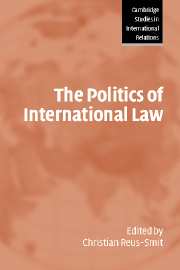Book contents
- Frontmatter
- Contents
- List of contributors
- Preface
- 1 Introduction
- 2 The politics of international law
- 3 When states use armed force
- 4 Soft law, hard politics, and the Climate Change Treaty
- 5 Emerging customary norms and anti-personnel landmines
- 6 International law, politics, and migrant rights
- 7 The International Criminal Court
- 8 The Kosovo bombing campaign
- 9 International financial institutions
- 10 Law, politics, and international governance
- 11 Society, power, and ethics
- Bibliography
- Index
- CAMBRIDGE STUDIES IN INTERNATIONAL RELATIONS
2 - The politics of international law
Published online by Cambridge University Press: 22 September 2009
- Frontmatter
- Contents
- List of contributors
- Preface
- 1 Introduction
- 2 The politics of international law
- 3 When states use armed force
- 4 Soft law, hard politics, and the Climate Change Treaty
- 5 Emerging customary norms and anti-personnel landmines
- 6 International law, politics, and migrant rights
- 7 The International Criminal Court
- 8 The Kosovo bombing campaign
- 9 International financial institutions
- 10 Law, politics, and international governance
- 11 Society, power, and ethics
- Bibliography
- Index
- CAMBRIDGE STUDIES IN INTERNATIONAL RELATIONS
Summary
In titling this book The Politics of International Law I have sought to exploit the double meaning of this phrase. On one reading, it refers to the way in which politics informs, structures, and disciplines the law. This is the reading most prevalent among International Relations scholars, the majority of whom still see international law as an epiphenomenon, a simple reflection of underlying power politics or a functional solution to co-operation problems. On another reading, however, the title conveys the idea of politics within law, the idea that law can be constitutive of politics, that politics may take a distinctive form when conducted within the realm of legal reasoning and practice. As explained in the preceding chapter, one of our central purposes is to elucidate these two faces of the politics of international law, to better understand the nature of international politics, how it conditions international law, and the way in which the law ‘feeds back’ to shape the expression of politics.
This chapter serves two principal tasks. Delivering on my promise in chapter 1, it develops a broad analytical framework for thinking about the mutually constitutive relationship between international politics and law – a framework that asks us to think about the nature of politics in a more expansive way than we have been accustomed to, and to credit law with more structuring power than we have been willing. As noted previously, this framework falls short of a ‘theory’.
- Type
- Chapter
- Information
- The Politics of International Law , pp. 14 - 44Publisher: Cambridge University PressPrint publication year: 2004
- 34
- Cited by

